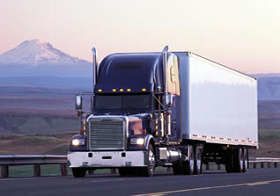New Medical Rules
Topic 11670 | Page 1

So 15 days after dec 22 I won't need to carry my shiny new medical card with me anymore?
So 15 days after dec 22 I won't need to carry my shiny new medical card with me anymore?
FMCSA says drivers only have to carry the exam certificate for 15 days after the physical for proof of medical certification. After that 15-day period, law enforcement will have the records in a database they can access at roadside.
15 days after you receive your Card from the Doctor, you can file it away, but I would be safe, and keep it with you, anyway. I would not put it past a DOT person to harass you, anyway. Better safe, than sorry.
CSA:
Compliance, Safety, Accountability (CSA)
The CSA is a Federal Motor Carrier Safety Administration (FMCSA) initiative to improve large truck and bus safety and ultimately reduce crashes, injuries, and fatalities that are related to commercial motor vehicle
FMCSA:
Federal Motor Carrier Safety Administration
The FMCSA was established within the Department of Transportation on January 1, 2000. Their primary mission is to prevent commercial motor vehicle-related fatalities and injuries.
What Does The FMCSA Do?
- Commercial Drivers' Licenses
- Data and Analysis
- Regulatory Compliance and Enforcement
- Research and Technology
- Safety Assistance
- Support and Information Sharing
DOT:
Department Of Transportation
A department of the federal executive branch responsible for the national highways and for railroad and airline safety. It also manages Amtrak, the national railroad system, and the Coast Guard.
State and Federal DOT Officers are responsible for commercial vehicle enforcement. "The truck police" you could call them.
Fm:
Dispatcher, Fleet Manager, Driver Manager
The primary person a driver communicates with at his/her company. A dispatcher can play many roles, depending on the company's structure. Dispatchers may assign freight, file requests for home time, relay messages between the driver and management, inform customer service of any delays, change appointment times, and report information to the load planners.
Good information, Serah. Thanks.
I'll keep my own copies, just in case what they have on record is inaccurate.
-mountain girl




So 15 days after dec 22 I won't need to carry my shiny new medical card with me anymore?
The exam certificate and medical card are two different entities. Always carry the medical card.

So 15 days after dec 22 I won't need to carry my shiny new medical card with me anymore?
The exam certificate and medical card are two different entities. Always carry the medical card.
Sorry, one in the same. I would still carry it.

I am running into a little obstacle right now with Averitt and their DOT Doctor. I have a 2 year Medical card here in KY, but Averitt requires you get another physical and another card with their Dr. The Dr. there doesn't like the fact that I have stents, and haven't had a treadmilll stress test for awhile. The reason I usually have to have a chemical stress test is that my hips aren't in the best shape, so they will fatigue before i can get my heart rate to the point they require. They don't interfere with my driving or anything like that though.
I went through orientation this week, and am on medical hold while he goes over my records from the cardiologist. Was supposed to meet the trainer Monday but that's not gonna happen now.
So, my question is this. If he won't approve me for Averitt, will my KY card I already have still be viable for work here locally? My cousin works for company here, and said they will hire me, but they don't have benefits and I would have to get my own insurance, and fund my own retirement.
Anybody that shed any light on this would be much appreciated.
DOT:
Department Of Transportation
A department of the federal executive branch responsible for the national highways and for railroad and airline safety. It also manages Amtrak, the national railroad system, and the Coast Guard.
State and Federal DOT Officers are responsible for commercial vehicle enforcement. "The truck police" you could call them.
Dm:
Dispatcher, Fleet Manager, Driver Manager
The primary person a driver communicates with at his/her company. A dispatcher can play many roles, depending on the company's structure. Dispatchers may assign freight, file requests for home time, relay messages between the driver and management, inform customer service of any delays, change appointment times, and report information to the load planners.Perkdaddy wonders:
So, my question is this. If he won't approve me for Averitt, will my KY card I already have still be viable for work here locally?
If your medical exam was accepted by your state (Kentucky), you are legal to drive according to your Kentucky CDL license. But maybe Averitt likes to have their own (trusted by Averitt) doctor check you out, if you want to work for them.
This exactly happened to me last week. I got my own DOT physical - my regular doctor is DOT certified - which I reported to Mississippi & got their receipt. I thought I was good to go. But that physical report was not acceptable to Swift. I had to run over to the terminal clinic and get a Swift approved physical. The Swift doctor did do the physical differently, and even a bit more thorough than my first physical.
CDL:
Commercial Driver's License (CDL)
A CDL is required to drive any of the following vehicles:
- Any combination of vehicles with a gross combined weight rating (GCWR) of 26,001 or more pounds, providing the gross vehicle weight rating (GVWR) of the vehicle being towed is in excess of 10,000 pounds.
- Any single vehicle with a GVWR of 26,001 or more pounds, or any such vehicle towing another not in excess of 10,000 pounds.
- Any vehicle, regardless of size, designed to transport 16 or more persons, including the driver.
- Any vehicle required by federal regulations to be placarded while transporting hazardous materials.
Terminal:
A facility where trucking companies operate out of, or their "home base" if you will. A lot of major companies have multiple terminals around the country which usually consist of the main office building, a drop lot for trailers, and sometimes a repair shop and wash facilities.
DOT:
Department Of Transportation
A department of the federal executive branch responsible for the national highways and for railroad and airline safety. It also manages Amtrak, the national railroad system, and the Coast Guard.
State and Federal DOT Officers are responsible for commercial vehicle enforcement. "The truck police" you could call them.
New Reply:
New! Check out our help videos for a better understanding of our forum features

















Preview:








 TT On Facebook
TT On Facebook
December 1, 2015
One part of an FMCSA rule published in April that made changes to the Federal Motor Carrier Safety Administration’s medical examination regulations will take effect Dec. 22.
Drivers going in for their DOT physicals after Dec. 22, 2015, will notice a new Medical Examination Report Form, which features more questions about medical history.
Also included in the new rule is a requirement of medical examiners to electronically submit on the National Registry the results of medical exams once a month. Until June 22, 2018, FMCSA says drivers only have to carry the exam certificate for 15 days after the physical for proof of medical certification. After that 15-day period, law enforcement will have the records in a database they can access at roadside.
After June 22, 2018, drivers won’t have to carry medical examiner’s certificates at all because examiners will have to submit exam results by midnight of the day the exam is conducted, and the results will be available to law enforcement immediately.
CSA:
Compliance, Safety, Accountability (CSA)
The CSA is a Federal Motor Carrier Safety Administration (FMCSA) initiative to improve large truck and bus safety and ultimately reduce crashes, injuries, and fatalities that are related to commercial motor vehicle
FMCSA:
Federal Motor Carrier Safety Administration
The FMCSA was established within the Department of Transportation on January 1, 2000. Their primary mission is to prevent commercial motor vehicle-related fatalities and injuries.
What Does The FMCSA Do?
DOT:
Department Of Transportation
A department of the federal executive branch responsible for the national highways and for railroad and airline safety. It also manages Amtrak, the national railroad system, and the Coast Guard.
State and Federal DOT Officers are responsible for commercial vehicle enforcement. "The truck police" you could call them.
BMI:
Body mass index (BMI)
BMI is a formula that uses weight and height to estimate body fat. For most people, BMI provides a reasonable estimate of body fat. The BMI's biggest weakness is that it doesn't consider individual factors such as bone or muscle mass. BMI may:
It's quite common, especially for men, to fall into the "overweight" category if you happen to be stronger than average. If you're pretty strong but in good shape then pay no attention.
Dm:
Dispatcher, Fleet Manager, Driver Manager
The primary person a driver communicates with at his/her company. A dispatcher can play many roles, depending on the company's structure. Dispatchers may assign freight, file requests for home time, relay messages between the driver and management, inform customer service of any delays, change appointment times, and report information to the load planners.Fm:
Dispatcher, Fleet Manager, Driver Manager
The primary person a driver communicates with at his/her company. A dispatcher can play many roles, depending on the company's structure. Dispatchers may assign freight, file requests for home time, relay messages between the driver and management, inform customer service of any delays, change appointment times, and report information to the load planners.